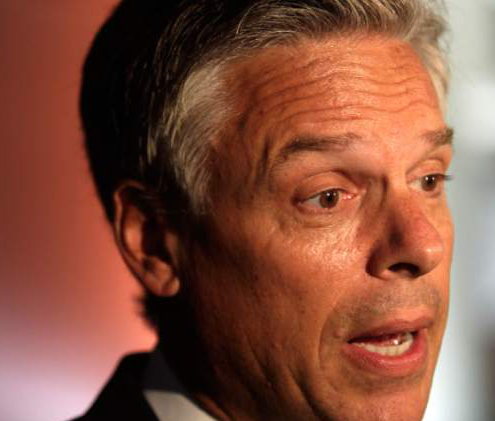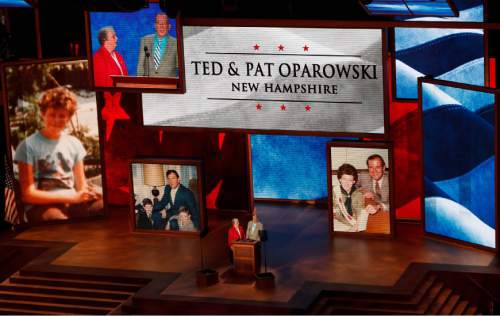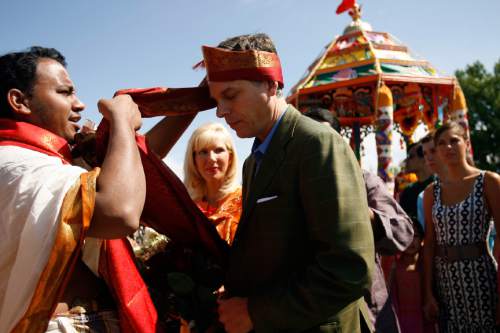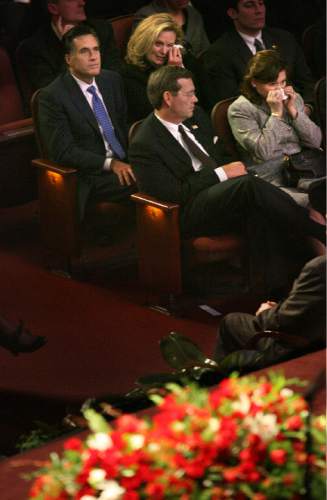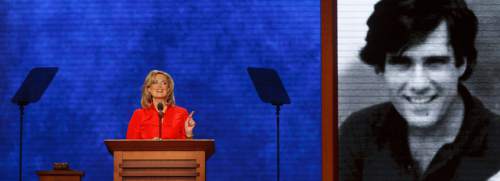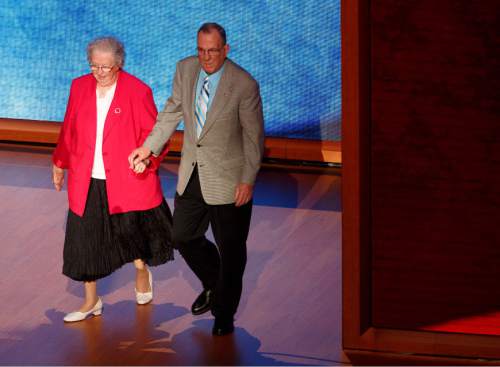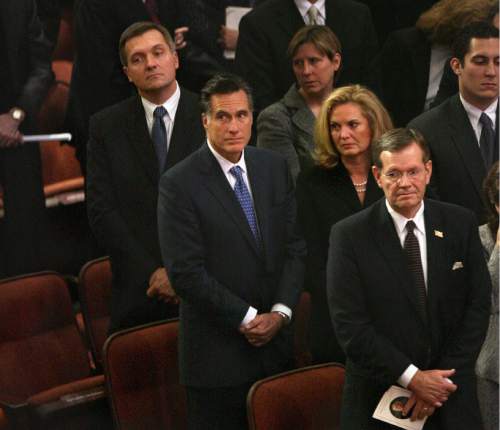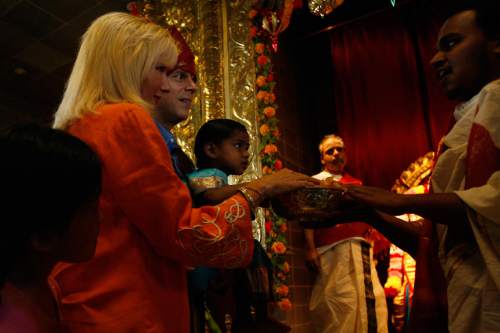This is an archived article that was published on sltrib.com in 2015, and information in the article may be outdated. It is provided only for personal research purposes and may not be reprinted.
After returning from Beijing in early 2012, Jon Huntsman headed to the University of South Carolina to offer the commencement address.
The next day, a Sunday, Huntsman could have easily visited any of the half-dozen Mormon wards, or congregations, in or around Charleston.
Instead, Huntsman headed to Seacoast, a nondenominational megachurch.
Running for and serving as Utah's governor, Huntsman was labeled a Mormon; in the Beehive State, no one really questions candidates or officeholders on how devout they are. As a candidate, he was teaching an Aaronic Priesthood class in his Mormon ward and, when elected, he occasionally dropped by an LDS service near the Governor's Mansion. But he also was a regular church hopper. He raised his adopted daughter Asha with a nod to the Hindu faith. Daughter Abby Huntsman wed in the Episcopal-run National Cathedral.
In 2011, as he hinted at White House ambitions, a reporter asked Huntsman point-blank whether he was still a member of The Church of Jesus Christ of Latter-day Saints.
"I'm a very spiritual person," he said, "and proud of my Mormon roots."
Pressed again, Huntsman sidestepped. "That's tough to define," he said. "There are varying degrees. I come from a long line of saloon keepers and proselytizers, and I draw from both sides."
That's not the answer Mitt Romney would have given. As young men, Huntsman and Romney had each traveled abroad on missions to share the Mormon message and seek converts. But through the years, their approaches diverged. Romney dove into church service, taking on leadership roles; Huntsman referred to himself as a cultural Mormon. Romney downed Diet Coke; Huntsman sipped Chardonnay.
A Newsweek cover illustration in June 2011 featured Romney, decked out in missionary garb, jumping, his hand on the Book of Mormon, and declared it was the "Mormon moment." The New York Times repeated the line. With Romney and Huntsman in the presidential race, HBO's "Big Love" and Broadway's "Book of Mormon" big hits, this was the time for the faith to enjoy the spotlight. But it also turned out to be an opportunity to show that Mormonism was not the monolith it had long been perceived.
Abby Huntsman, Jon's second-oldest daughter, says her dad is one of the "most spiritual guys I've ever met," but he doesn't talk much about Mormonism. When living in Asia, Abby recalled going to various churches, the same as when he was governor.
"That's always been who he is," she said. "I don't think what he said nationally was anything different."
Keeping his faith private, though, has earned disdain from some Mormons who saw Huntsman's aloofness as offensive.
Sen. Todd Weiler, a Mormon Republican like most members of the Utah Legislature, said Romney was more popular in the state than Huntsman, largely because of their disparate approaches to faith.
"Mormons believe that Mitt Romney is sincere about his faith and Jon Huntsman Jr. is a charlatan," charged Weiler, R-Woods Cross. "He kind of pretended to be a card-carrying Mormon when he ran for governor, but it was all a ruse."
An indicator of the popularity gap: Just weeks into Huntsman's presidential outing, a poll in Utah showed Romney 50 points ahead of him.
For journalists, the idea of a nondevout Mormon became a fascination. Many asked whether they should call him a "Jack Mormon," a term used to describe a Latter-day Saint who perhaps knocks back a few beers but still believes. Some saw it as a strategy by Huntsman to cool potential problems with the evangelical wing of the Republican Party.
Devout or not, Huntsman remained dogged by his religion. Not even 24 hours into his official presidential bid, as he toured a plant that makes infrared grills, a reporter wanted to know if he was Mormon.
"I believe in God," Huntsman responded. "Good Christian. I'm very proud of my Mormon roots."
No one was asking Newt Gingrich or Rick Santorum about being Catholic. Nevertheless, two Mormons running for president in 2012, and gaining remarkable media attention, were clear signs of emerging acceptance for the faith. And while Romney and Huntsman were bitter adversaries, the Romney camp did appreciate the effect Huntsman's campaign had on questions about Mormonism.
"In '12, with Huntsman in the race, it was a shared burden," said a former Romney adviser.
—
The Mormon candidate • It was far worse for the former Massachusetts governor when he first waded into presidential politics.
In October 2007, Romney, hoping to garner support of the right flank of his party, headed to WHO Radio in Des Moines, Iowa. WHO is a 50,000-watt talk-radio station that aired conservative heavyweights such as Rush Limbaugh and Sean Hannity, and had once, in the 1930s, employed a young upstart named Ronald Reagan.
The interview should have been easy: Drop in, spout some stump-speech lines, answer a few softballs.
It was not.
Romney, late for the interview, rushed into the studio in a crisp white shirt and blue tie, all smiles when host Jan Mickelson introduced him. That was the high point of the interview.
Mickelson, a self-proclaimed libertarian pro-lifer who hosted the No. 1 morning show in the Hawkeye State, quizzed Romney about Roe v. Wade and other firebrand GOP issues. Then the host wondered if Romney should have been excommunicated from the LDS faith for being pro-choice previously. Romney tried to explain, but time ran out.
"I don't like coming on the air and having you go after my church," he charged.
"I'm not going after — I agree with your church," Mickelson said.
"I'm not running as a Mormon," Romney responded, "and I get a little tired of coming on a show like yours and having it all about Mormon."
"I don't mind it being about that."
"I do. I do."
"I agree with the ethics of your church, for Pete's sake."
"So do I," Romney said, standing up, pushing his chair in and trying to control his rage.
Mike Huckabee was the former governor of Arkansas. Tim Pawlenty led Minnesota. John McCain was the maverick senator from Arizona.
Mitt Romney was the Mormon.
No matter his business résumé or his Olympic cred, it seemed on the campaign trail the only adjective attached to him in news stories — and even water-cooler conversations — was his faith. Most Americans have heard of Mormons, even if most don't know what they believe, wrongly think they are polygamists or deem them non-Christian. And polls were clear that an LDS candidate had only a slightly better chance of winning the White House than a Muslim or an atheist. It's a tough place to start from if you're running for president as a Republican already worried about charges of being a flip-flopper and the ex-governor of a liberal state.
Romney wanted to talk about government overspending, about returning to constitutional principles, about America being the "shining city on top of the hill," as he liked to paraphrase a famous Reagan line. At WHO in Des Moines, Mickelson wanted to talk Mormon doctrine.
—
Caught on tape • "I have to get back on the air. But I want you to know I take this stuff real seriously," Mickelson said.
"Well, I don't," Romney said, facetiously. "For me, all this stuff is frivolous. Pfft. C'mon. I'm running for president."
"Just — just relax," the host countered.
It was a candid moment for Romney, who had attempted to keep the focus on policy, on red-meat issues, not diverted by curiosity about what church he attended. He and his team were quick to tell anyone who asked that he was not running to be pastor in chief. But Mickelson had gotten under his skin, and, unbeknownst to Romney, the whole exchange was captured on video.
"Nobody was more surprised than I that he folded up so quickly," Mickelson later said. "I had no idea he was going to come unglued like this."
Back at 585 Commercial St. in Boston, Team Romney's headquarters, national press secretary Kevin Madden and communications director Matt Rhoades watched the video. Surprised and angry, they brainstormed how to deal with it.
"We have to own this," Rhoades said. "This is feisty."
The video was going to circulate, so the Romney folks figured they should spin it their way: Romney looking tough in the face of an offensive line of questioning. It was a rare move by Romney aides, who generally steered clear of Mormon stuff.
Religion is always a touchy conversation, and in his presidential bids, Romney found himself in the awkward role of trying to define himself while also defending a faith so strange to so many people.
The LDS Church has fought essentially the same PR battle as it comes of age. The faith claims more than 15 million members worldwide, a small blip in the population of 7 billion. But its tremendous growth in the 20th century rocketed the once-obscure band of faithful into the mainstream. Mormons who have lived outside the Mormon Belt — the largely LDS region in and around the Rocky Mountains — often face questions about how many wives they have, whether they really abstain from alcohol or about secret rituals performed in their members-only temples. Beyond the questions are the jokes, some barbed, because making fun of Mormons seems to be socially acceptable.
—
A JFK-like speech • Running for president made Romney synonymous with his faith, and he had to figure out how to handle that. One thing was clear from the outset: He wasn't going to distance himself from the religion he had been born into, had served his whole life and profoundly believed.
Instead, his team planned to mimic George Romney's mantra during his unsuccessful 1968 presidential bid: He was running as an American, not a Mormon. Voters were electing a president, not a pastor. Voters didn't care what faith a candidate believed in as long as he or she had faith.
After initially resisting, he finally gave into advisers pushing him to make a splashy televised speech about religion, in the vein of John F. Kennedy, who famously addressed his Catholicism to assuage concerns that the pope would direct his actions.
At the George H.W. Bush Presidential Library in College Station, Texas, Romney referred to Kennedy.
"Like him, I am an American running for president," Romney said. "I do not define my candidacy by my religion. A person should not be elected because of his faith nor should he be rejected because of his faith. Let me assure you that no authorities of my church, or of any other church, for that matter, will ever exert influence on presidential decisions."
Romney encountered a test of his faith as his campaign was struggling to pick up primary states. Gordon B. Hinckley, the stoic Mormon leader, died and his funeral was set for Feb. 2, 2008. Super Tuesday, which could give Romney a lifeline or doom his bid, was three days away, but he put the campaign on hold and flew to Salt Lake City.
Romney failed to make any headway Feb. 5, when 21 states voted to pick their nominee. That essentially ended his 2008 campaign, but Romney positioned himself for another run.
—
Being human • Four years later, after a grueling primary season, Romney clinched the 2012 nomination and afterward he appeared to be more comfortable showing the nation a slice of his religious life, largely as a way to humanize the candidate.
It was at the Republican National Convention in Tampa, where Romney's faith went on full display. Ann Romney capped the first night, offering the national television audience the heartfelt story of meeting her husband, rearing their five boys and being diagnosed with multiple sclerosis. She also became the first convention speaker to utter the word "Mormon" and talked of the countless hours Mitt spent helping others.
Mormons Pat and Ted Oparowski came next, bringing the audience to silence as they spoke of son David's diagnosis with non-Hodgkin lymphoma. Romney would visit the 14-year-old in the hospital. Toward the end, David learned that Romney was a lawyer and asked him to write his will. On a yellow legal pad, Romney scrawled out that David's skateboard, model rockets and fishing gear would go to his best friends; his brother would get his treasured Ruger .22 rifle.
"How many men do you know would take the time out of their busy lives to visit a terminally ill 14-year-old and help him settle his affairs?" asked Pat Oparowski. Romney gave David's eulogy as he was buried in his Boy Scout uniform.
The campaign decided not to air the testimonials during prime time, when networks provided wall-to-wall coverage, instead they went with Clint Eastwood and an empty chair.
Despite that blunder, it was heartening for Romney and Mormons everywhere to see their faith in the spotlight — in a positive way. Shortly after the convention, the Romneys returned to their Wolfeboro, N.H., home and, on Sunday, the Romney brood piled into the Mormon ward there. J.W. "Bill" Marriott, a hotel magnate and longtime friend of the family, rose to the podium to thank the Romneys.
"There has never been as much positive attention to the church, thanks to the wonderful campaign of Mitt Romney and his family," Marriott said. " ... Today we see the church coming out of obscurity, and we see that 90 percent of what has been written and said … 90 percent of it has been favorable."
Romney's religion came up infrequently in the general election, and while he didn't win the presidency, Romney, with the help of Huntsman, ended any serious talk that a Mormon couldn't be a legitimate contender for the nation's highest office.


